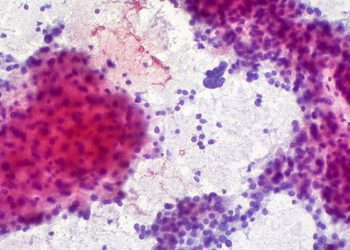No benefit of erlotinib in combined hepatocellular carcinoma treatment
1. In a phase III trial of over 700 patients with hepatocellular carcinoma (HCC), there was no significant difference in overall survival between combination therapy with sorafenib plus erlotinib versus sorafenib plus placebo.
Evidence Rating Level: 1 (Excellent)
Study Rundown: The annual mortality from hepatocellular carcinoma (HCC) ranges from 250 000 to 1 million globally, which represents the third most frequent cause of cancer mortality worldwide. The current standard of care for advanced HCC is the use of sorafenib, a multikinase inhibitor, based on the results of the SHARP (Sorafenib Hepatocellular Carcinoma Assessment Randomized Protocol) trial in 2007. Additional targeted agents may serve as beneficial in combination with sorafenib. Erlotinib, an oral EGFR tyrosine kinase inhibitor, has previously been shown to improve overall survival in phase II trials. The purpose of this trial was to evaluate the results of the phase III randomized control trial of adjunct erlotinib with sorafenib in patients with advanced HCC. Over 700 patients with advanced HCC were recruited and randomized to sorafenib plus either erlotinib or placebo. At the conclusion of this trial, the combination therapy did not produce a significant improvement in overall survival or time to progression compared to placebo. Furthermore, the combination arm was associated with a shorter overall treatment duration due to adverse drug events. The results of the trial supports the hypothesis that EGFR signaling may not be an important part of advanced HCC pathophysiology and that sorafenib monotherapy remains the standard of care in this patient population.
Click to read the study in JCO
Relevant Reading: Sorafenib in advanced hepatocellular carcinoma
In-Depth [randomized controlled trial]: The SEARCH (Sorafenib and Erlotinib Randomized Trial Protocol for the Treatment of Patients with Hepatocellular Carcinoma) trial was a phase III, randomized, double-blinded, placebo-controlled trial comparing sorafenib plus placebo versus sorafenib plus erlotinib. Patients were included in the trial if they had advanced HCC and Child-Pugh class A cirrhosis who were naïve to systemic treatments. In total, 720 patients from 128 centers worldwide were recruited and randomized to sorafenib plus erlotinib (n=362) or sorafenib plus placebo (n=358). The primary endpoint was overall survival (OS); secondary endpoints included time to disease progression (TTP), disease control rates, treatment duration, withdrawal rate, and drug-related adverse events. At the conclusion of the trial, the combination arm did not demonstrate significant benefit compared to the placebo arm in median OS (9.5 versus 8.5 months; HR: 0.929; p=0.408) or TTP (3.2 months versus 4 months; HR: 1.135; p=0.18). Furthermore, although serious drug-related serious adverse events were similar between both groups, there was significantly higher withdraw rates in the combination arm (34%) compared to the placebo arm (23.8%). This resulted in significantly shorter treatment duration the combination arm (86 days) versus the placebo arm (123 days).
More from this author: Rituximab linked with reduced chronic immune disease following stem cell transplantation, High-dose prophylaxis for hemophilia increases costs with minimal benefit, Ambrisentan found ineffective against idiopathic pulmonary fibrosis
Image: PD
©2014 2 Minute Medicine, Inc. All rights reserved. No works may be reproduced without expressed written consent from 2 Minute Medicine, Inc. No article should be construed as medical advice and is not intended as such by the authors, editors, staff or by 2 Minute Medicine, Inc.








